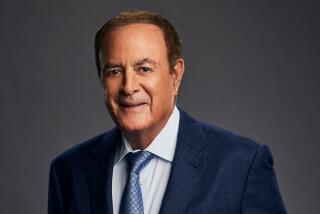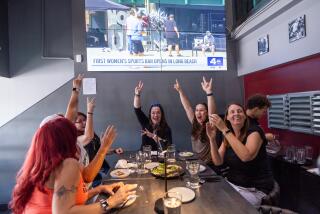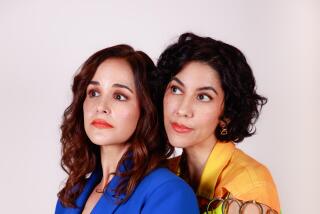She’s Game for Challenges
- Share via
If there’s one thing Claudia Trejos hates about her job, it’s the makeup. Send her out to cover a football game in a downpour or ask her to interview yet another surly athlete, and she’s off without complaint. But summon the only female sports director in Southern California’s television market--and one of just a handful nationwide--to the powder room and she trudges off with all the enthusiasm of a condemned prisoner heading for the gallows.
Blush and eye shadow may be just as much a part of the television news tradition as the Klieg light, but Trejos has never had much respect for tradition. If she did, she’d still be in her native Colombia doing . . . well, she wouldn’t be doing the sports every night, that’s for sure.
“This,” she says, “is not the kind of opportunity you get back home.”
It’s one she’s made the most of here, however. At KWHY-TV, a Spanish-language independent, Trejos anchors three daily sports reports each weekday and co-hosts “Mundo Deportivo” (“Sports World’), a Sunday prime-time wrap-up that has become the second-most-watched program of its kind in the nation’s largest Spanish-language market. The latter accomplishment is an important one for the upstart station, which still shares its programming day with the English-language “Business News.” And it’s an accomplishment made all the more significant by the fact that Trejos is the one giving out the scores.
“Sports in the Latino world is for males only,” says Mexican-born co-anchor Fernando Gonzalez, a veteran sports reporter and KWHY’s news director. “For the Mexicans, we think we males know everything about sports. So, c’mon, a lady talking about sports? It’s like a handicap to her. To show the audience that, ‘Hey, I know what I’m talking about. I’m a woman, but so what? That’s part of the deal.’ ”
Yet if Trejos is blazing any trails, it’s by accident, not design. When she left home 13 years ago, it was to study science and medicine--first in Switzerland, then in California--not to further the cause of female sportscasters.
“It is important. Specifically it’s important that sports, like the rest of the nature of broadcast news, reflect the population it’s serving,” says Sherrie Mazingo, a media consultant and visiting professor of journalism at the University of Minnesota, who believes that Trejos may be the only female sports director in Spanish-language TV in the U.S. “It’s only been in the last five to seven years that women have made any inroads in sports broadcasting at all.
“The fact that she’s doing it six nights a week is wonderful. And unusual. In terms of Spanish-language broadcasting, they have been quietly doing a lot of experimental activities . . . and actually pulling down some firsts that English-language broadcasting needs to consider and hasn’t.”
The 14th child in a family of 17 children--just four of whom are female--Trejos grew up a tomboy, which proved a major disappointment for her mother.
“My mom always dreamed of the little girl with the dress with ruffles,” Trejos says. Instead she got a daughter who only wore a skirt because it was part of her school uniform.
Fashion remains something of a weak point. On a recent day, she did the news wearing a bright-red blazer pulled over a colorfully striped Ralph Lauren blouse, an ensemble that clashed loudly with the torn, faded jeans and boots she was wearing. That it was a typical ensemble is something the station has made its peace with by insisting Trejos keep her legs beneath the desk when she’s on the air.
“As you can see,” she apologizes, “I’m not the most formal person in the world.”
Trejos came to KWHY 15 months ago from Fox Sports Americas, where she started out “doing all the menial things that not many people enjoy doing.” She took the job mainly because of the hours--working at night fit in well with her schedule at UCLA’s medical school. But after four years, she had worked herself into a position as production coordinator, and sports journalism began looking more like a profession than a pastime.
“Nowadays you have insurance [companies] telling doctors . . . what they can do for people or with people,” Trejos says. “And at the same time, I just got tired of so much [pain]. I found myself bringing work with me home. .”
She eventually left school 18 months shy of graduation to concentrate on television, and slowly began working her way onto the air, doing commentary over a video feed of the U.S. Open for South American television and recording a number of voice-overs. Gonzalez, who called Lakers and Kings games as well as other events for Fox Sports Americas, was impressed and brought Trejos over to KWHY, where he headed up the news team.
“It doesn’t matter for us if she’s a man or a woman. But it’s obvious the impact on TV is very, very different,” says Gonzalez, who believes Trejos’ presence has already boosted the number of male sports fans watching the station.
But that didn’t keep the audience from being skeptical at first.
“It was very tough in the beginning,” Trejos says. “And I don’t think it was precisely because I was a woman but because I was the new kid on the block. [But] it has also worked for me because they go, ‘OK, let’s see what she’s got.’ They have always given me a chance to either prove them wrong or just confirm what they already thought.
“People have come around. You’d be amazed.”
Still, Trejos doesn’t consider herself an activist--or even a feminist. But there was one episode in Las Vegas, where she went to cover a boxing match, that made her realize what she is doing is more than a job to some.
“A lady came up and said . . . ‘I’m so proud of you. I wish I could have gotten a chance to prove myself as an equal rather than just a woman,’ ” Trejos related. “I think that would have made my mom proud.”
More to Read
Go beyond the scoreboard
Get the latest on L.A.'s teams in the daily Sports Report newsletter.
You may occasionally receive promotional content from the Los Angeles Times.











